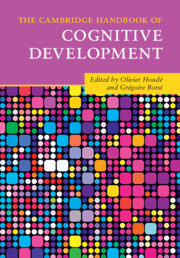Book contents
- The Cambridge Handbook of Cognitive Development
- The Cambridge Handbook of Cognitive Development
- Copyright page
- Contents
- Figures
- Tables
- Contributors
- Introduction
- Part I Neurobiological Constraints and Laws of Cognitive Development
- Part II Fundamentals of Cognitive Development from Infancy to Adolescence and Young Adulthood
- Part III Education and School-Learning Domains
- Index
- Plate Section (PDF Only)
- References
10 - Foundational Considerations
Does Primitive Number Sense Provide a Foothold for Learning Formal Mathematics?
from Subpart II.1 - Infancy: The Roots of Human Thinking
Published online by Cambridge University Press: 24 February 2022
- The Cambridge Handbook of Cognitive Development
- The Cambridge Handbook of Cognitive Development
- Copyright page
- Contents
- Figures
- Tables
- Contributors
- Introduction
- Part I Neurobiological Constraints and Laws of Cognitive Development
- Part II Fundamentals of Cognitive Development from Infancy to Adolescence and Young Adulthood
- Part III Education and School-Learning Domains
- Index
- Plate Section (PDF Only)
- References
Summary
Children with below average school entry mathematics knowledge are likely to remain behind their peers throughout schooling, and go on to face poor employment prospects and low wage-earning potential as adults. Previous research has identified key skills (number system knowledge) in the first-grade that predict math achievement ten years later. Recent studies have tried to identify early-emerging skills in infancy and during the preschool years that may provide a foundation upon which the formal skills they learn in school can be built. One candidate skill is the non-verbal ability to estimate and reason about numerosities that depends on an evolutionary ancient, and phylogenetically common, mechanism for representing quantities – the approximate number system (ANS). While there is evidence that ANS acuity (precision) predicts math achievement concurrently and prospectively, several studies have failed to find a link, or identified other quantitative skills (e.g., ordinal knowledge) or domain-general skills (e.g., intelligence, executive function, working memory) that are better predictors. Evidence for and against the claim that the ANS is a foundational skill that is critical for the development of formal mathematical knowledge is reviewed, followed by a synthesis of work by Geary and colleagues in which they examined the growth of many different domain-specific (quantitative) and domain-general skills longitudinally over four years. The findings suggest that the link between ANS acuity and math achievement is mediated by other skills, especially cardinal knowledge. The ANS still remains a significant factor, however, because our findings also suggest that it plays an important role in the acquisition of cardinal knowledge, and the conceptual insight children appear to have when they first come to understand counting and the natural numbers.
Information
- Type
- Chapter
- Information
- The Cambridge Handbook of Cognitive Development , pp. 216 - 241Publisher: Cambridge University PressPrint publication year: 2022
